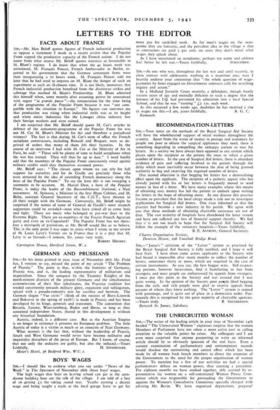RECOMMENDATION-LETTERS SIR,—Your notes on the methods of the Royal Surgical
Aid Society will have the wholehearted support of social workers throughout the country. Apart from the waste of money in postage and stationery by people too poor to obtain the surgical appliances they need, there is something degrading in compelling the unhappy patient to tout for letters. As a society we have always been opposed to any system which places upon the recipient or the patient the onus to solicit a given number of letters. In the case of Surgical Aid letters, there is abundant evidence of pain and suffering involved to the patient through the delay which must inevitably occur between the date of being granted authority to beg and receiving the required number of letters.
Our second objection is that begging for letters has a demoralising effect upon the applicant. The recipient of a pathetic appeal who has already parted with his or her letters is frequently moved to send money in lieu of a letter. We have many examples where this means of obtaining easy money has led the patient to embark upon writing for letters in the hope of obtaining more. In one diocese this practice became so prevalent that the local clergy made a rule not to investigate applications for Surgical Aid letters. One vicar informed us that the practice had become a new industry in his parish. We agree with you that these methods of obtaining charitable assistance are out of date. The vast majority of hospitals have abandoned the letter system prid have not suffered any loss of financial support thereby. We feel that it is not too much to hope that the Surgical Aid Society will follow the example of the voluntary hospitals.—Yours faithfully, Denison House, 296 Vauxhall Bridge Road.






















 Previous page
Previous page